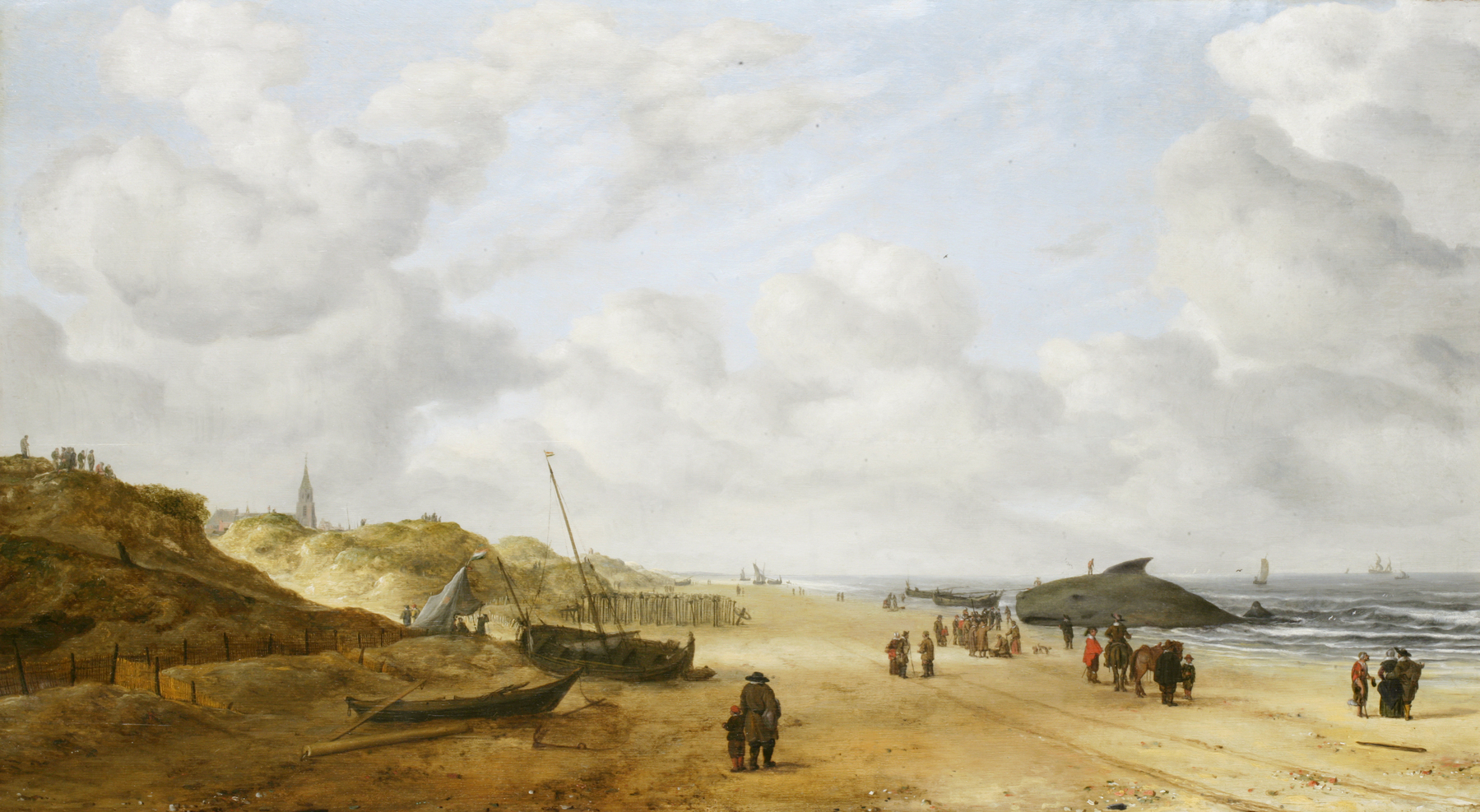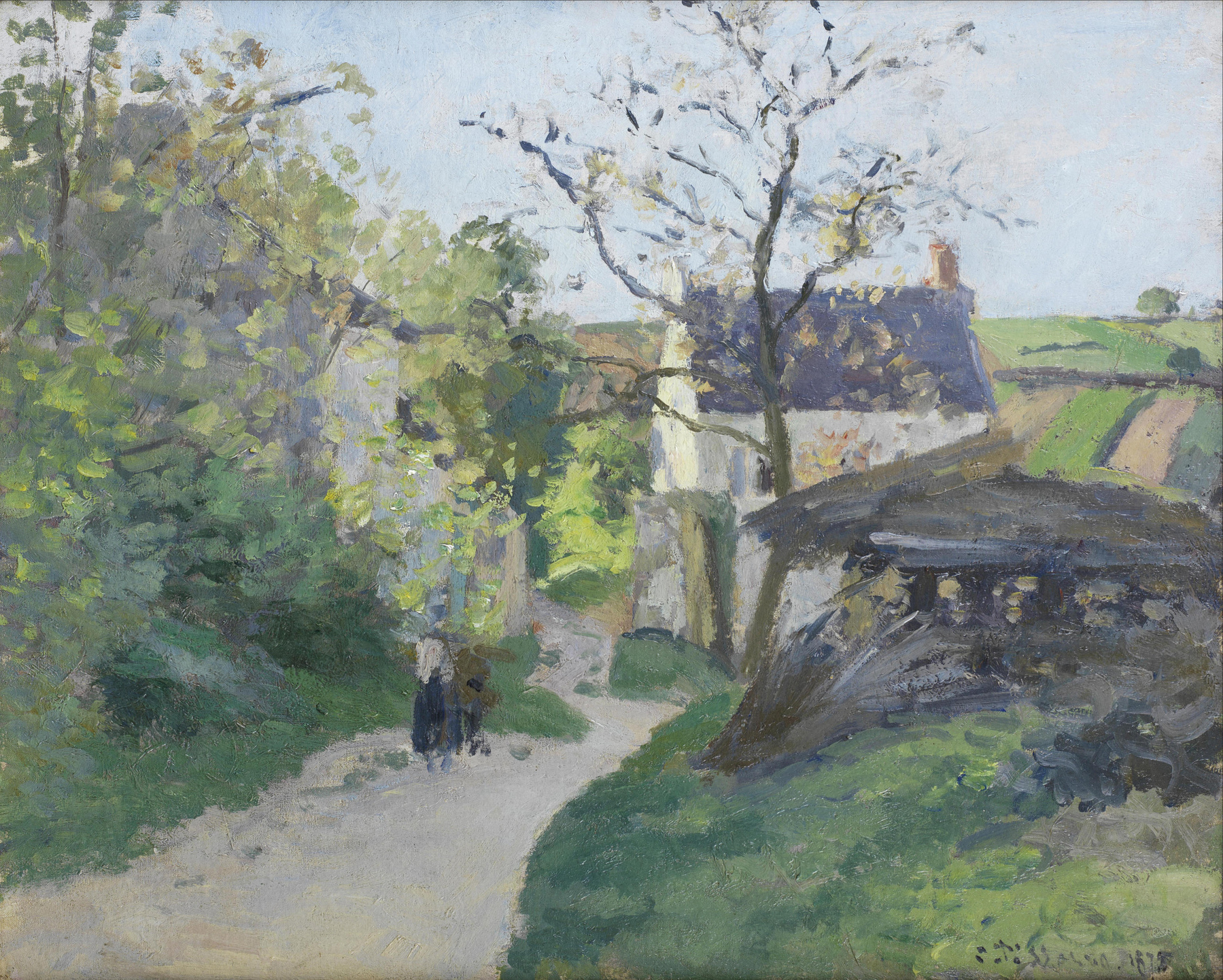View of Scheveningen Sands (c. 1630s) by Hendrick van Anthonissen :

View of Scheveningen Sands (c. 1630s) by Hendrick van Anthonissen :


This is basically the Platonic Form of what I previously wrote against at Mere O: Redeeming Productivity. Whatever floats your boat, I guess.
The Great Walnut Tree (Le Grand Noyer) (1875) by Camille Pissarro:

Part One covered Keller’s discussion of “Gospel Theology.” Obviously, it’s important to start with what is (and isn’t) the gospel. Now, Keller proceeds in Part Two to consider how gospel theology is actually lived out, both individually and corporately (“Gospel Renewal”). Taking his cues from the biblical and historical patterns of revival, Keller wants to know what we can learn about renewal: why we need it, what it is, and how we can pursue it. Keller understands “revival” and “renewal” as basically synonymous terms; I certainly prefer “renewal” given some of the baggage attached to “revival.”
Indeed, before diving in, I might as well put the disclaimer up front: I’m rather ambivalent about the whole notion of revival. At a personal level, I’ve come of age spiritually within American evangelicalism, which means revivalism is pretty deep in my bones. As Douglas Sweeney has suggested, evangelicalism is “a movement of orthodox Protestants with an eighteenth-century twist.” That twist, of course, is the revivals of the so-called Great Awakening, with all the attendant practices (and anxieties) that have shaped evangelical piety ever since. This means that one of the defining features of evangelicalism has been an emphasis on the individual and the need for personal conversion. This has led to a prioritizing of interiority and religious introspection, and a corresponding de-emphasis on community, sacrament, liturgy, and structure—with the church being the primary collateral damage in all of it. And while I’ve become more committed to orthodox Protestantism over the years, I’ve become less committed to the revivalistic “twist” of evangelicalism. I’ve linked approvingly to an essay questioning the need for revival. I also think Phillip Cary’s argument is basically correct that the genius of Protestant theology—captured especially by Luther (but also present in Calvin, Hooker, and others)—is that it delivers Christ to us in the announcement of the gospel. This, in turn, leads to a Protestant form of piety that ought to be unreflective and externally-focused: the Christian looks outside himself, believing God’s word of promise to genuinely—sacramentally—deliver Christ to him. This key insight of Protestant theology, which for Cary is most clearly expressed in Luther, gets obscured in later Protestantism. (Which also helps to explain why I have much less appetite for the Puritans than I used to.) Different folks will quibble with where things went wrong and how wrong they went (or if they went wrong at all). But I tend to think that the “twist” of revivalistic American evangelicalism has, in many respects, twisted the original emphases and intentions of the reformers. (I also think revivalism tends to assume a Christendom context, in which “we need revival” because the culture is slipping toward secularism and only a large-scale movement of God will turn the country back towards Christians being in the cultural driver’s seat. But if Christendom isn’t the ultimate goal, then revival becomes less necessary: gratefully received if the Lord chooses to bring it, but not at all needed for us to faithfully carry out our task.)
Perhaps that was more background than necessary, but it seemed good to lay out where I’m coming from. We’ll treat the three chapters in this part under the three corresponding headings below.
The Need for Gospel Renewal (WHY)
In chapter four, Keller opens his discussion of gospel renewal by distinguishing between personal and corporate renewal. Personal gospel renewal happens to an individual when core gospel doctrine (i.e., teaching about sin and grace) is “actually experienced and not just known intellectually.” He expounds,
This personal renewal includes an awareness and conviction of one’s own sin and alienation from God and comes from seeing in ourselves deeper layers of self-justification, unbelief, and self-righteousness than we have ever seen before. There is a new, commensurate grasp of the wonder of forgiveness and grace as we shed these attitudes and practices and rest in Christ alone for salvation. Perhaps we have previously said that we were “resting in Christ’s work, not our own work” for salvation, but when we experience gospel renewal, we have a new clarity about what this means in our mind and a new experience of actually doing it with our heart. (54)
Corporate gospel renewal, according to Keller, “is a season in which a whole body of believers experience personal gospel renewal together.” Keller argues that corporate gospel renewal is continually needed, given the human propensity to slide back into man-made forms of religion:
Over time, all churches, no matter how sound their theology, tend to lose sight of the uniqueness of the gospel and fall into practices that conform more to other religions or to irreligion. Their doctrinal instruction loses sight of how each doctrine plays a role in the gospel message, and their moral instruction is not grounded in and motivated by the finished work and grace of Christ. The leaders of the church must always be bringing the gospel to bear on people’s minds and hearts so that they see it as not just a set of beliefs but as a power that changes us profoundly and continually. Without this kind of application of the gospel, mere teaching, preaching, baptizing, and catechizing are not sufficient. (54)
Keller says that “the default mode of the human heart is works-righteousness.” This tendency to slide away from the gospel and back to “religion” can result in: smug self-satisfaction, insecurity, anxiety, self-hatred (when we fail to live up to the standards), defensiveness, a critical spirit, racial/cultural ethnocentricity (to bolster a sense of our righteousness), an allergy to change, and other forms of spiritual deadness. Because this is the regular pattern of individuals and churches when left to themselves, Keller believes that the revival/renewal dynamic is needed as the antidote. As he explains, revival can be widespread (national or regional) or more narrow (affecting one congregation or even just a part of one). What revivals share in common is that they are “seasons in which the ordinary operations of the Holy Spirit are intensified manyfold.” He continues, “In revival, the ordinary means of grace produce a great wave of newly awakened inquirers, soundly converted sinners, and spiritually renewed believers. The church growth that inevitably results cannot be accounted for by demographical-sociological shifts or efficient outreach programs” (55). Revival is, in summary, “a consistent pattern of how the Holy Spirit works in a community to arrest and counteract the default mode of the human heart.”
Keller briefly touches on the history of modern revivals and, in particular, some of the most common criticisms. While he agrees that revivals have in some ways undermined established churches and traditional modes of community formation, Keller argues that, for instance, the Great Awakening was a reasonable response to the massive social changes brought on by the Industrial Revolution and market capitalism. Keller is balanced, wanting to uphold the older model of parish instruction and incorporation into a community while also recognizing the need for personal conversion and the inadequacy of older parish models to cope with modern urbanization. He offers two primary reasons for adopting a nuanced vision of gospel renewal.
First, gospel renewal fits our times. Keller suggests that the traditional, “church-centered” approach was better suited to a previous era, when there was a dominant church and religious tradition in a culture, and when society was held together by shared symbols and customs and beliefs. In such a context, you inherited the same faith as everyone else and the parish church was responsible for processing people through the major inflection points of life (e.g., confirmation, marriage, death). This model has broken down in a culture as highly mobile and pluralistic as ours. As Keller explains, “No one really inherits their belief systems as they once did. People actively choose among competing sets of beliefs and worldviews and must be persuaded through personal appeals to do so.” In this context, Keller believes the “revivalist emphasis on persuasion, conversion, and individual self-examination” is necessary.
Second, gospel renewal focuses on the heart. For Keller, this reason is more important because it has biblical support. Citing Romans 10:9, Keller argues that renewal is necessary because salvation is a matter of the heart: there must be personal trust. The Bible speaks repeatedly about the heart as the center of a person—as the “control center” from which thoughts, attitudes, and actions pour forth. Therefore, it’s no wonder that God cares a great deal about the heart. Keller looks at examples in both Testaments to support his point. As he concludes,
Unbalanced revivalism indeed undermines the work of the established church. But balanced revivalism—a commitment to corporate and individual gospel renewal through the ordinary means of grace—is the work of the church. This is because it is possible (even common) for a person to be baptized, to be an active member of the church, to subscribe to all biblical doctrines, and to live according to biblical ethics, but nonetheless to be wholly unconverted. Revivalist ministry emphasizes conversion and spiritual renewal, not only for those outside the church, but also for those inside the church. Some need to be converted from clear unbelief; others need to see, to their surprise, that they’ve never been converted; still others need to sense their spiritual stagnation. (60)
If revival’s needed to fix that, then count me in (though I still prefer the language of renewal).
The Essence of Gospel Renewal (WHAT)
Keller moves in chapter five to address the what of gospel renewal. He asks: “What does the gospel do that actually changes people in a congregation? How can the distinct and unique theological truths of the gospel be formulated in ways that produce new, Spirit-led, Christ-centered motivation in people, whether their starting point is religion or irreligion?” (63)
In order to help people experience genuine gospel renewal, it is important to sharply distinguish religion, irreligion, and the gospel. Religion and irreligion, as different as they appear at a superficial level, are both ways of avoiding God: either by ignoring him altogether (in the case of irreligion) or by developing a moral righteousness to present to God as your own (in the case of religion). Keller points out how the Bible regularly depicts these approaches to God. For instance, the early chapters of Romans deal with both the irreligious (1:18-32) and the religious (2:1-3:20) before offering the gospel solution. Or, take Jesus’s encounters with various people in the Gospels. In each case, Scripture shows how we can go wrong in multiple ways in our pursuit of God.
Thus, when communicating the gospel, we must distinguish it both from irreligion (disobeying and disregarding God) and religion (obeying God as a means of self-salvation). The gospel must be sharply distinguished from general, moralistic religion. In fact, many churchgoers, according to Keller, are “elder-brotherish—angry, mechanical, superior, insecure.” So, to help self-righteous churchgoers experience genuine spiritual renewal, and to make the gospel clear to secular people who assume it is all about religious observance, it is crucial to sharply distinguish the gospel from these other approaches. As Keller summarizes,
In the end, legalism and relativism in churches are not just equally wrong; they are basically the same thing. They are just different strategies of self-salvation built on human effort. No matter whether a local church is loose about doctrine and winks at sin or is marked by scolding and rigidity, it will lack the power it promises. The only way into a ministry that sees people’s lives change, that brings joy and power and electricity without authoritarianism, is through preaching the gospel to deconstruct both legalism and relativism. (66)
Keller vividly illustrates the difference between these approaches by contrasting moralistic behavior change with gospel behavior change. In moralistic behavior change, you are trying to appeal to a person’s self-centeredness in order to get the desired behavior, whether through pride or fear of punishment or some other motivation. The problem, according to Keller, is that this approach “simply manipulates and leverages radical selfishness without challenging it.” When you motivate with moralistic behavior change, you haven’t actually penetrated to “the fundamental self-regard and self-absorption that is the main problem of the human heart” (67). Many attempts to change another person’s behavior do so by appealing to the self-centered impulses of the heart, hoping to bring about external compliance; they don’t actually do anything to change the fundamental orientation of the heart.
Gospel behavior change, by contrast, doesn’t try to motivate with any of these self-centered tactics. Rather, the gospel pierces to the deep motivational structures of the heart itself. As Keller explains,
The gospel, if it is truly believed, helps us out of the extreme neediness that is natural to the human heart. We have the need to be constantly respected, to be appreciated, and to be highly regarded. We need to control our lives—not trusting God or anyone else with them. We need to have power over others in order to boost our self-esteem…. Without the power of the Spirit, our hearts don’t really believe in God’s delight or grace, so they operate in their default mode. But the truths of the gospel, brought home by the Spirit, slowly but surely help us grasp in a new way how safe and secure, how loved and accepted, we are in Christ. Through the gospel, we come to base our identity not on what we have achieved but on what has been achieved for us in Christ. (68-69)
Keller argues that the gospel works to change our behavior in a fundamentally different way, because it uproots the extreme selfishness and neediness that drives our sinful behavior. Unless that problem is dealt with, and not only once but continually, then all the other strategies for bringing about external compliance will be short-lived and powerless.
Keller ends the chapter by highlighting the importance of idolatry as a framework for exposing our failure to believe and apply the gospel. As Keller explains (summarizing Luther), “Anything we look to more than we look to Christ for our sense of acceptability, joy, significance, hope, and security is by definition our god—something we adore, serve, and rely on with our whole life and heart. In general, idols can be good things (family, achievement, work and career, romance, talent, etc.—even gospel ministry) that we turn into ultimate things to give us the significance and joy we need” (70). While the danger is that Keller’s approach might become formulaic or predictable (especially in the hands of a less skilled practitioner), the truth is that renewal always comes back to the gospel. If we want individuals (and communities!) to experience actual transformation brought about by God’s grace, then we must do the hard work of exposing those things that keep people from experiencing and embracing God’s love revealed in Christ.
The Work of Gospel Renewal (HOW)
The final chapter in this part deals with the means of gospel renewal, as well as some of the evidences of genuine renewal. While the Spirit is the “ultimate source” of renewal, there are several “instrumental” sources that God invites us into and uses in the process, including extraordinary prayer, gospel rediscovery, gospel application, and gospel innovation.
For prayer, Keller points out that seasons of renewal have always been accompanied by some kind of extraordinary pray beyond the normal patterns. He outlines three characteristics of the kind of “frontline” prayer that’s desirous of God’s kingdom: 1) a request for grace to confess sins and to humble ourselves; 2) a compassion and zeal for the flourishing of the church and the reaching of the lost; 3) a yearning to know God, to see his face, to glimpse his glory.
Perhaps even more essential, though, to gospel renewal is a recovery of the gospel itself. This recovery, according to Keller, involves an emphasis on salvation by grace alone and the necessity of the new birth. While denying tenets of the faith and become heterodox is always a danger, it is perhaps equally common for churches to fall into dead, lifeless orthodoxy. As Keller warns,
Some churches hold to orthodox doctrines but with imbalances and a lack of proper emphasis. Many ministries spend more time defending the faith than propagating it. Or they may give an inordinate amount of energy and attention to matters such as prophecy or spiritual gifts or creation and evolution. A church may become enamored with the mechanics of ministry and church organization. There are innumerable reasons that critical doctrines of grace and justification and conversion, though strongly held, are kept “on the shelf.” They are not preached and communicated in such a way that connects to people’s lives. People see the doctrines—yet they do not see them. It is possible to get an “A” grade on a doctrinal test and describe accurately the doctrines of our salvation, yet be blind to their true implications and power. In this sense, there are plenty of orthodox churches in which the gospel must be rediscovered and then brought home and applied to people’s hearts. When this happens, nominal Christians get converted, lethargic and weak Christians become empowered, and nonbelievers are attracted to the newly beautified Christian congregation. (74)
Keller then considers some ways that a church can bring the power and implications of the gospel to bear on its people. First, it happens through preaching. Second, by raising up lay leaders who can minister the gospel to others. Third, it happens as small groups have an “experiential” element where they’re dealing with heart issues and sin struggles. Fourth, by simple informal conversations among congregants about the gospel and its application. Fifth, as pastors and other church leaders bring the gospel into their pastoral counseling.
Keller also mentions “gospel innovation” as a final ingredient in renewal, arguing that creativity and innovative methods have often accompanied revivals in the past. Next, Keller zooms in on what kind of preaching actually works toward gospel renewal:
- Preach to distinguish between religion and the gospel.
- Preach both the holiness and the love of God to convey the richness of grace.
- Preach not only to make the truth clear but also to make it real.
- Preach Christ from every text.
- Preach to both Christians and non-Christians at once.
Finally, the chapter (and the whole part of the book) concludes with signs of gospel renewal:
- Nominal church members become converted.
- Non-Christian outsiders are converted as people are attracted to the newly beautified church and its authentic worship, its service in the community, and the surprising absence of condemning, tribal attitudes.
- Formerly “one-sided” churches find that some of the “secondary elements” (that historically fell outside their primary focus) emerge during a season of renewal.
- It is felt in the vibrancy of a church’s worship.
- A renewed interest in the gospel is accompanied by new interest in biblical theology that is connected to real life.
- Barriers begin to break down that impede relationships, leading to more authentic expressions of community with others.
- There is a humility that fosters empathy and patience with others, enabling relationships to thicken and deepen within the church.
- Lots of people are humbled and shaped by the gospel, which means there is not just “transfer” growth but actual new converts who love to evangelize, serve, work for justice, do works of mercy, and renew the culture.
Keller’s vision in these chapters is stretching. On one level, it’s absolutely glorious. At the same time, I can also feel myself recoiling from it in fear and insecurity. It’s so easy to settle for ordinary, run-of-the-mill church. I can barely allow myself to imagine that God would bring this kind of renewal in my context, even on a limited scale. But, each time a fire is lit, it looks a little different. No need to compare. Keller ends on the right note: we can’t bring it about; God must do it. He quotes from Psalm 126, in which the people cry out: “Restore our fortunes, O LORD!”
Lily and Bella’s favorite part of the Veloway: the bearded dragon belonging to the super kind and knowledgeable Nicole Fisher


Finished reading: A Wrinkle in Time by Madeleine L’Engle 📚
Enjoyable read, even if the ending was a little abrupt—and a little too neat and tidy. Oh well.

Miroslav Volf, describing the communal analogue to his notion of a “catholic personality”—namely, a “catholic community”:
No church in a given culture may isolate itself from other churches in other cultures declaring itself sufficient to itself and to its own culture. Every church must be open to all other churches. We often think of a local church as a part of the universal church. We would do well also to invert the claim. Every local church is a catholic community because, in a profound sense, all other churches are a part of that church, all of them shape its identity. As all churches together form a world-wide ecumenical community, so each church in a given culture is a catholic community. Each church must therefore say, “I am not only I; all other churches, rooted in diverse cultures, belong to me too.” Each needs all to be properly itself.
Miroslav Volf, unpacking what he calls a “catholic personality”:
When God comes, God brings a whole new world. The Spirit of God breaks through the self-enclosed worlds we inhabit; the Spirit re-creates us and sets us on the road toward becoming what I like to call a “catholic personality,” a personal microcosm of the eschatological new creation. A catholic personality is a personality enriched by otherness, a personality which is what it is only because multiple others have been reflected in it in a particular way. The distance from my own culture that results from being born by the Spirit creates a fissure in me through which others can come in. The Spirit unlatches the doors of my heart saying: “You are not only you; others belong to you too.”